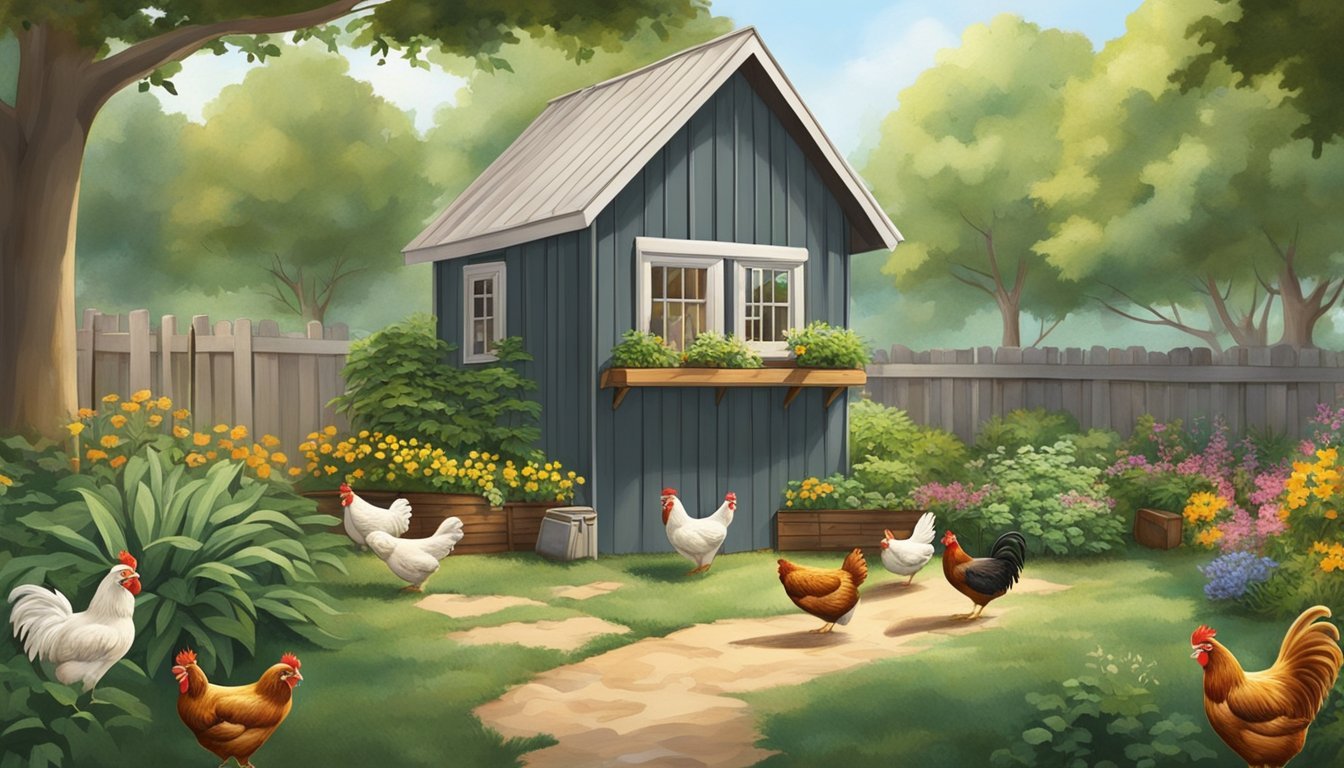Keeping Backyard Chickens in Boulder, CO
Essential Tips for Beginners
Backyard chickens have become a popular aspect of sustainable living, and in Boulder, Colorado, this trend is no exception. Enthusiasts of this movement maintain small poultry flocks for various reasons, including fresh eggs, natural pest control, and as a rewarding hobby. Boulder's climate and community support make it an accommodating environment for raising chickens. However, understanding the local regulations is crucial for any Boulder resident interested in keeping backyard chickens to ensure they are in compliance with city codes.
The city of Boulder allows residents to keep chickens, but with specific regulations to balance urban livestock benefits with neighborhood harmony. These rules are designed to address concerns about noise, odors, and potential health issues. The Boulder Revised Code does not list specific animals that can be kept, which is notable because it does not explicitly prohibit chickens. This is in contrast with some localities that have a defined list of allowed species. Prospective poultry keepers must also be mindful of the welfare of the birds, providing daily care, secure housing, and proper nutrition to maintain a healthy and happy flock.
In addition to municipal codes, Boulder County sets out broader regulations, permitting up to eight backyard chickens—hens only, no roosters—on suburban residential properties. However, individual cities within the county may have further restrictions; for instance, Louisville and Lafayette allow up to six chickens, while Longmont permits only four. It's important for residents to consider these variations when planning to keep backyard chickens. Given the variance in regulations by area, anyone looking to embark on keeping backyard chickens should research their specific local ordinances to ensure their coop complies with all necessary requirements.
Local Laws and Regulations
When keeping backyard chickens in Boulder, CO, residents must be aware of the local regulations, which vary across different jurisdictions. Adherence to these laws is crucial for the legality and harmony of urban poultry keeping.
Boulder Chicken Ordinance
In Boulder, Colorado, city ordinances permit residents to keep up to an eight-chicken limit per suburban residential property. However, it is important to note that roosters are prohibited to avoid noise issues. Individuals looking to raise chickens should verify if they need a permit and should remain diligent about the chicken laws that might be subject to change.
Surrounding Areas Regulations
Regulations differ in the surrounding areas. For instance:
Erie: May have different regulations; residents should consult with local authorities.
Louisville: Allows for a maximum of six chickens.
Longmont: Permits up to four chickens on a residential property.
Denver: Specific rules that govern chicken keeping, which include a restriction on the number of chickens and the requirement of obtaining a permit.
Aurora: Following advocacy efforts, residents are now allowed to keep up to four hens.
Homeowner Association Guidelines
It is imperative that homeowners also check with any Homeowner Association (HOA) guidelines that may be in place. HOAs may have more restrictive laws than the local ordinances and may require additional permits or have limits on the number of chickens or the type of dwellings where they can be kept.
Residents must ensure compliance with state and local laws as well as any specific local regulations in their area. Keeping backyard chickens requires consistent responsibility and legal awareness.
Choosing the Right Chicken Breed
Selecting the right chicken breed for a backyard flock in Boulder, Colorado entails considering local climate conditions, the chickens' temperament, and their egg-laying capabilities.
Popular Breeds for Backyards
In Boulder's diverse climate, several chicken breeds thrive well:
Leghorn: Renowned for their impressive egg-laying ability, Leghorns can provide a steady supply of eggs.
Rhode Island Red: These chickens are robust, versatile, and known for their consistent production of brown eggs.
Ameraucana: They lay distinctive blue or green eggs and adapt well to various living conditions.
Wyandotte: These birds are both aesthetically appealing and productive, known for good egg-laying even in colder months.
Cold Weather Considerations
Boulder's colder months necessitate chicken breeds that can withstand frigid temperatures:
Wyandotte: Their dense feathering protects them against the chill.
Ameraucana: They are also suited for cooler weather due to their smaller combs and tufted ears, which are less prone to frostbite.
Brahma: Known for their resilience in cold weather, Brahmas are another good choice, although not included in the search results, they merit consideration for Boulder's climate.
Temperament and Egg Production
Good temperament and egg production are essential for backyard flocks:
Leghorn: These birds typically have an active and lively temperament and can produce more than 300 white eggs annually.
Rhode Island Red: Known for their friendly nature and reliable egg-laying rate of brown eggs.
Ameraucana: They are often kept for their social demeanor and unique egg colors which can add a variety to the protein yield of a backyard flock.
Designing and Building a Coop
When constructing a chicken coop in Boulder, CO, one must consider space allocation, protection measures against extreme weather and predators, and the inclusion of essential structures like nesting boxes and roosting spaces.
Coop Size and Location
The size of a chicken coop should be determined by the number of hens it will house. A general guideline is to allocate 1 to 4 square feet per chicken inside the coop, with larger breeds requiring more space. The location should offer good drainage to prevent water accumulation and should be situated in a manner that protects the coop from direct wind and harsh sun while maintaining accessibility for cleaning and egg collection.
Ideal Allocation:
Small breeds: 1 sq ft/hen
Large breeds: 4 sq ft/hen
Safety and Ventilation
Security against predators like foxes, raccoons, and wild birds is critical. A coop should be predator-proof with sturdy materials and fine mesh on windows and ventilation openings. Ventilation is vital to prevent moisture build-up and maintain air quality, but the coop also needs to shield chickens from extreme temperatures. Vents should be placed high, ideally in the eaves, to promote warm, stale air to leave the coop while fresh, cool air enters without causing drafts at the bird level.
Security Measures: Reinforced mesh, secure latches
Ventilation Specs: High-placed vents, adjustable for temperature changes
Nesting Boxes and Roosting Spaces
Each hen requires access to a nesting box lined with clean materials for egg laying. Standard dimensions are 12 inches wide, 12 inches high, and 12 inches deep for each box, with one box for every 3-4 hens. Roosts should be designed to accommodate 6-12 inches per bird and positioned over a screen to facilitate easier cleaning of droppings. Roosting bars should be at least 2 inches wide to allow chickens to roost comfortably.
Nesting Box Specs:
Size: 12"x12"x12"
Quantity: 1/3-4 hens
Roosting Space Requirements:
Personal space per hen: 6-12"
Bar width: Minimum 2 inches
Essentials for Chicken Care
Proper chicken care is essential for the well-being of backyard poultry in Boulder, Colorado. One's duties include consistent feeding, watering, and health checks to ensure a thriving flock.
Feeding
Chickens require a balanced diet to maintain their health. The type of feed will vary depending on their age and purpose. For example, laying hens need a layer feed high in calcium, while growing chicks benefit from a starter feed rich in protein. Here is an outline of essential feeding practices:
Adult Chickens: A daily ration of complete poultry feed.
Chicks: A starter feed until approximately 18 weeks or until they begin laying.
It's also important to provide grit, which aids in digestion, available in a separate feeder.
Feeding tips include:
Use a sturdy feeder to minimize waste.
Store feed in a dry, vermin-proof container.
Avoid overfeeding snacks or treats; these should not exceed 10% of their diet.
Watering
Adequate hydration is critical. Chickens should always have access to clean, fresh water, especially during Boulder's sun-intensive summers. Conventional watering practices are:
Fresh water must be available at all times; check and refill waterers daily.
In winter, ensure water is not frozen; heated waterers may be necessary.
Clean waterers regularly to prevent disease and detritus accumulation.
Daily Health Checks
Routine inspections can prevent or catch early signs of diseases, mites, and lice, which are common issues in poultry. Be vigilant about:
Observing for any signs of lethargy, lameness, or changes in behavior.
Checking for external parasites like mites and lice, primarily around the vent area and under wings.
Examining the condition of feathers, eyes, beak, and skin.
Roosters require the same daily checks. However, be aware of local ordinances regarding noise and neighborhood disturbances. When it comes to health checks, one should:
Isolate any bird exhibiting symptoms of illness to prevent the spread of disease.
Provide proper treatment as soon as a health issue is identified, which may require consulting with a veterinarian.
Protecting Your Flock
In Boulder, CO, keeping backyard chickens involves safeguarding them against predators, diseases, and pests. These protective measures ensure their health and the continuity of egg production.
Preventing Predators
One must implement robust security measures to protect chickens from common predators such as raccoons, coyotes, and birds of prey.
Physical Barriers: Sturdy fences and covered runs prevent easy access. Wire mesh should be fine enough to keep out smaller predators, such as rats, and it should be buried underground to deter digging.
Coop Security: Ensure that the chicken coop is fortified with locks and that all openings are sealed properly, especially at night.
Disease Management
The health of a flock is paramount, and disease management plays a critical role.
Biosecurity Protocols: Limit the flock's exposure to wild birds and enforce strict sanitation measures to prevent the spread of diseases such as avian flu.
Regular Health Checks: Monitor the flock's health closely, looking for signs of illness or changes in egg production, which can indicate health issues.
Pest Control
Pests like mites, lice, and rodents not only affect the chickens' health but can also impact their living environment and the quality of egg production.
Sanitation: Regular cleaning of the coop and proper disposal of waste help minimize the risk of pest infestation.
Preventative Treatments: Treat the chickens and the coop with approved pest control products to keep mites and lice at bay.
Rearing and Managing Chicks
Rearing chicks in Boulder, Colorado requires a well-planned brooder setup, an understanding of their growth stages, and careful integration with the established flock to maintain a healthy pecking order.
Brooder Setup
A brooder serves as the initial home for baby chicks, ensuring they are kept warm and safe during their first few weeks. It should be equipped with:
Heat source: Maintain a temperature of about 95 degrees Fahrenheit in the first week, and reduce by 5 degrees each subsequent week.
Bedding: Pine shavings or similar material to absorb waste and encourage natural behaviors.
Feeder and waterer: Accessible and clean to promote healthy growth.
Space: Provide a minimum of 2 square feet per chick to prevent overcrowding.
Growth Stages
Understanding the growth stages of chicks is crucial for proper care:
0-6 weeks: Known as the brooding period, baby chicks will need constant warmth and will start developing feathers.
6-20 weeks: As pullets, they require more space and start establishing the pecking order.
After 20 weeks: They are considered mature, with egg production typically beginning around this age.
Integrating with the Flock
Introducing new chickens to an established flock requires patience:
Gradual introduction: Allow the older flock to see but not touch the younger birds for several days.
Monitor interactions: Supervise initial encounters to manage aggressive behavior.
Equal access: Ensure all birds have access to food, water, and space to escape conflicts.
Sustainability and Community Engagement
In Boulder, Colorado, backyard chicken keeping is more than just a hobby—it's a sustainable practice that fosters community engagement. Residents connect through shared values of organic living and supporting local food systems, with initiatives that turn food waste into a resource and fresh eggs into a means of uniting gardeners and non-gardeners alike.
Feeding Chickens with Food Waste
In an impressive display of sustainability, community members often feed their chickens with organic food scraps from their own gardens or local farmers' markets. This practice not only reduces household waste but also provides chickens with a diverse, non-GMO diet, leading to healthier, free-range chickens. Boulderites frequently:
Compost garden waste and kitchen scraps to create nutritious chicken feed.
Collaborate with local businesses to collect pre-consumer food waste that is suitable for chickens.
Sharing Surplus Eggs
Owning backyard chickens often leads to an abundance of fresh eggs, which are more nutrient-rich than many store-bought alternatives. The surplus eggs become a cornerstone for local sharing and bartering within the community:
Farmers' Market: Excess eggs can be sold or traded at the Boulder County Farmers' Market.
Community Networks: Egg sharing strengthens bonds between neighbors, often through informal egg exchanges.
Through these activities, Boulder's residents exemplify a strong commitment to sustainability and community engagement.
Addressing Common Concerns
When keeping backyard chickens in Boulder, CO, residents often have questions regarding noise, odor, and local regulations. These concerns are manageable with informed practices and good neighborliness.
Noise and Odor Management
Noise and odor are two common issues associated with keeping chickens. To minimize noise, especially in urban areas, it's often advised to avoid keeping roosters, as they are known for their loud crowing. For odor control, regular cleaning of the coop is essential. Use these best practices for managing a residential property with chickens:
Clean Coop Frequently: Remove waste and wet bedding regularly.
Proper Ventilation: Ensure the coop is well-ventilated to reduce humidity and the accumulation of odors.
Compost Manure: Compost chicken manure properly to use as fertilizer, reducing waste and smell.
Handling Complaints
Dealing with complaints promptly and diplomatically can prevent escalation to HOA or legal issues. If a neighbor expresses concern about the chickens:
Communicate: Discuss the issue openly to understand specific concerns.
Collaborate: Work together to find a solution, such as relocating the coop or improving cleanliness.
Staying Informed About Chicken Care
During the recent pandemic, interest in backyard chickens has risen, creating a need for more comprehensive knowledge about care and local regulations. To adhere to Boulder's chicken ordinance and local laws, remain informed through:
Local Classes: Boulder County often offers classes on poultry care.
Regular Research: Stay updated on any changes in local laws regarding backyard poultry.
By understanding and addressing these common concerns, one can maintain a peaceful and law-abiding backyard chicken environment that benefits both the chickens and the community.








